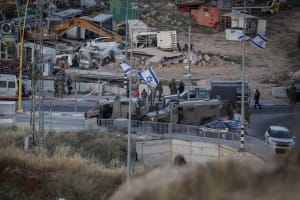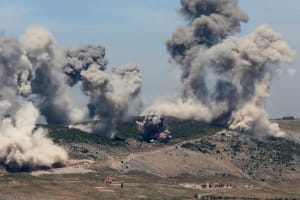Amid continuing protests, Herzog says Israel is in state of 'internal emergency'

Israeli President Isaac Herzog expressed deep concern over the current situation in Israel at a ceremony marking the 50th anniversary of the Yom Kippur War.
“Half a century after the Yom Kippur War, Israeli society is divided and polarized, and the crisis that has accompanied us for nine months — is tearing us apart, directly harming society, the economy and security,” Herzog said at the Latrun Memorial outside of Jerusalem.
“There is no denying that we are in a real internal state of emergency. There is no denying that this is a time for soul searching, for learning lessons, for taking responsibility. We must all internalize the fact that our national resilience and the security of the nation are directly tied to the internal Israeli situation,” Herzog added.
Herzog spoke just days after fights and scuffles broke out in public places in Tel Aviv on Yom Kippur when worshippers tried to set up partitions between men and women during public prayer services while members of the secular community protested against them. The fighting began after Israel's High Court upheld an earlier ruling by a lower court to allow the municipality to forbid partitions between men and women during public prayer services in Tel Aviv.
Following the Yom Kippur War of 1973 – one of the most existential wars Israel has ever fought against its enemies – Herzog warned that Israel must take “urgent steps” to resolve the current crisis and to bridge the rifts in Israeli society to keep Israel safe.
“Bridging our different divisions are the most important and urgent steps that we have to take as a society in order to maintain the security of the State of Israel, 50 years after the Yom Kippur War. Particularly in these days, it is important to listen, to behave with moderation, respect and responsibility, to lower the flames, to reach out a hand and to come to wide agreements,” Herzog urged.
Herzog was not the only high-ranking official to caution Israelis of the dangers that exist if they continue on the current trajectory.
Israel Defense Forces Chief-of-Staff Herzi Halevi, speaking at the same ceremony, warned that the IDF is not able to function the way it should when Israeli society is so deeply divided.
“An argument that leaves behind it a polarizing divisive rift within Israeli society is dangerous,” the military chief said.
“Given the security challenges, it’s arrogant to allow this polarizing debate and to assume that the IDF is immune from the effects of destructive polarization is a dangerous concept,” Halevi added.
He also noted the calls for IDF soldiers to refuse combat service as a sign of protest against the government’s judicial overhaul, as well as those who have criticized protesting reservists and service members.
“It’s forbidden to attack those in uniform, who have devoted years to Israel’s security, that’s irresponsible,” said Halevi.
“Calling for the younger generation to refuse to enlist in combat service — that’s a dangerous conception. Calls by reservists to refuse to show up for missions harm security and the IDF.”

The All Israel News Staff is a team of journalists in Israel.













